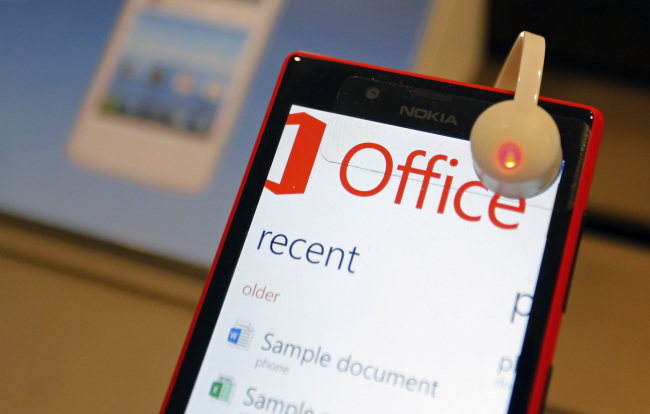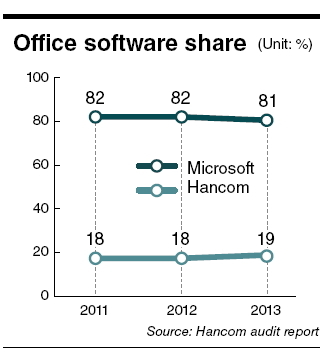Google, Hancom join office software race
‘Freemium’ becomes key strategy as developers seek upper hand
By Korea HeraldPublished : April 9, 2014 - 20:47
After reigning for nearly two decades in the global personal computer office suite market, Microsoft is facing challenges from new contenders seeking to carve out bigger slices of the pie in the market for mobile productivity applications.
So far, it looks like the challengers are mostly relying on so-called “freemium” strategies to attract customers.
A significant example is Google, which began handing out its Quickoffice mobile application, free of charge, in September 2013. The set of mobile office applications with which users can create and edit documents online previously cost $14.99 for the Quickoffice Pro version, and $19.99 for the Pro HD version.
The move was seen as part of Google’s efforts to overtake Microsoft in the mobile office software market.
Google’s productivity apps are regarded as easy-to-use online workstations, but they are said to still fall short of Microsoft’s desktop office products, such as Word and Excel, which dominate the market.
In efforts to catch up, Google offered an additional 10 GB of space in Google Drive, a cloud storage service, to those who subscribed to Quickoffice during the week following its release.
Google has also made the application available on Apple’s iOS platform starting this month.
Not to be outdone, Satya Nadella, the new CEO of Microsoft, hit back by announcing in March the release of office applications for Apple’s iPad. Previously, Office was available only for Microsoft’s mobile devices.
Nadella’s goal to increase the company’s fan base was achieved as the software giant added 12 million new users in just a week.
So far, it looks like the challengers are mostly relying on so-called “freemium” strategies to attract customers.
A significant example is Google, which began handing out its Quickoffice mobile application, free of charge, in September 2013. The set of mobile office applications with which users can create and edit documents online previously cost $14.99 for the Quickoffice Pro version, and $19.99 for the Pro HD version.
The move was seen as part of Google’s efforts to overtake Microsoft in the mobile office software market.
Google’s productivity apps are regarded as easy-to-use online workstations, but they are said to still fall short of Microsoft’s desktop office products, such as Word and Excel, which dominate the market.
In efforts to catch up, Google offered an additional 10 GB of space in Google Drive, a cloud storage service, to those who subscribed to Quickoffice during the week following its release.
Google has also made the application available on Apple’s iOS platform starting this month.
Not to be outdone, Satya Nadella, the new CEO of Microsoft, hit back by announcing in March the release of office applications for Apple’s iPad. Previously, Office was available only for Microsoft’s mobile devices.
Nadella’s goal to increase the company’s fan base was achieved as the software giant added 12 million new users in just a week.

The new Microsoft chief also rebranded the Office Web Apps, a set of free online office applications, as Office Online, promoting the online services for those who want to use free office apps similar to Quickoffice but with greater sophistication.
“His latest moves reflected the software behemoth’s rising concerns in the face of unprecedented challenges in the mobile era after a reign of more than 20 years in the world’s desktop office suite market,” an industry watcher said.
Microsoft Office is also facing competition, as Apple recently developed the iWork office suite, along with other apps including iPhoto and iMovie for iOS users.

Competition from Korea
Faced with the uphill battle against global players, Hancom, a Korean office suite maker, teamed up with Samsung Electronics.
The Korean software firm announced earlier this year that its office suite Hancom Office Viewer will be preinstalled on Samsung’s Galaxy Note Pro and Galaxy Tab Pro.
Hancom also said it would not charge users of the Samsung tablet PCs to install the full version of its applications.
“Hancom does not see the latest release of free office software from Google and Microsoft as threats, but rather sees it in a positive light, as it will help widen the mobile office suite market,” said Kim Ga-bee, a manager at Hancom’s public relations team.
In the meantime, market analysts were upbeat about Hancom’s future success.
“Up to 20 percent of the Samsung tablet PCs buyers will likely download the office packages,” said Kim Hyun-seok, an analyst from Shinhan Investment, adding, “Hancom’s sales revenue from the sales of the office suite for the tablet PCs will likely reach up to 21 billion won.”
By Kim Young-won (wone0102@heraldcorp.com)
-
Articles by Korea Herald


![[Exclusive] Korean military set to ban iPhones over 'security' concerns](http://res.heraldm.com/phpwas/restmb_idxmake.php?idx=644&simg=/content/image/2024/04/23/20240423050599_0.jpg&u=20240423183955)

![[Graphic News] 77% of young Koreans still financially dependent](http://res.heraldm.com/phpwas/restmb_idxmake.php?idx=644&simg=/content/image/2024/04/22/20240422050762_0.gif&u=)



![[Pressure points] Leggings in public: Fashion statement or social faux pas?](http://res.heraldm.com/phpwas/restmb_idxmake.php?idx=644&simg=/content/image/2024/04/23/20240423050669_0.jpg&u=)










